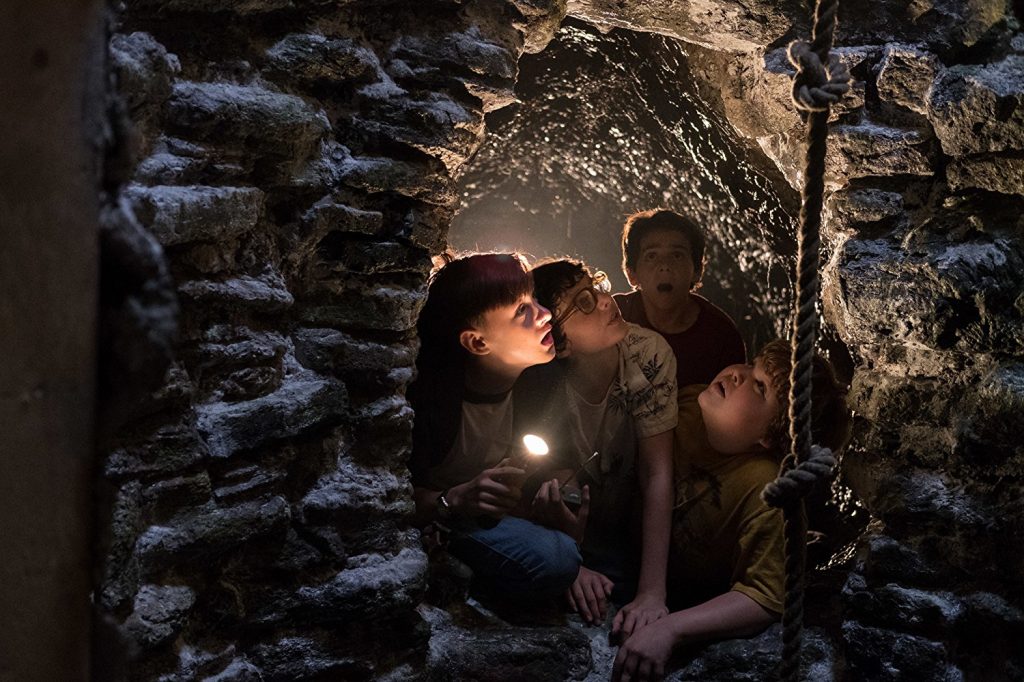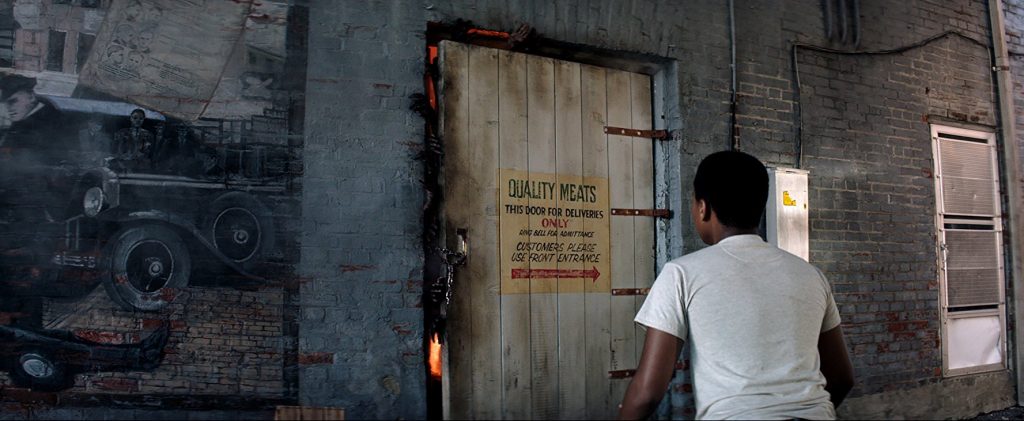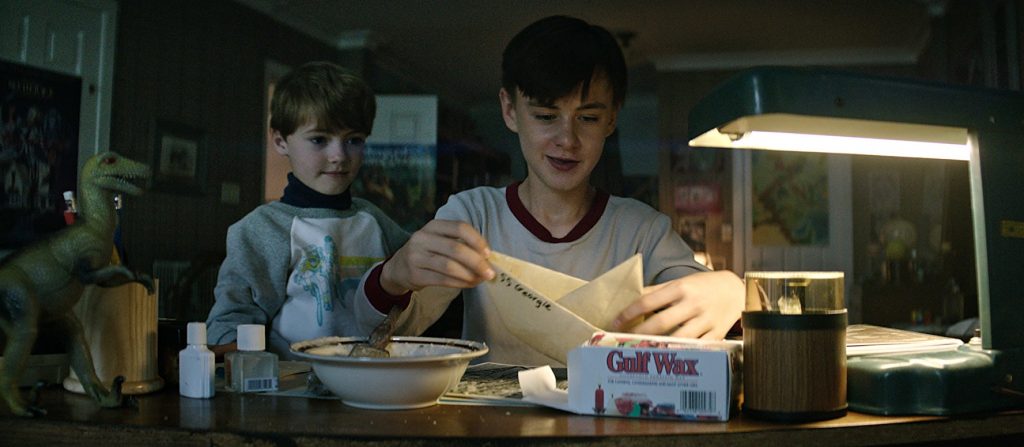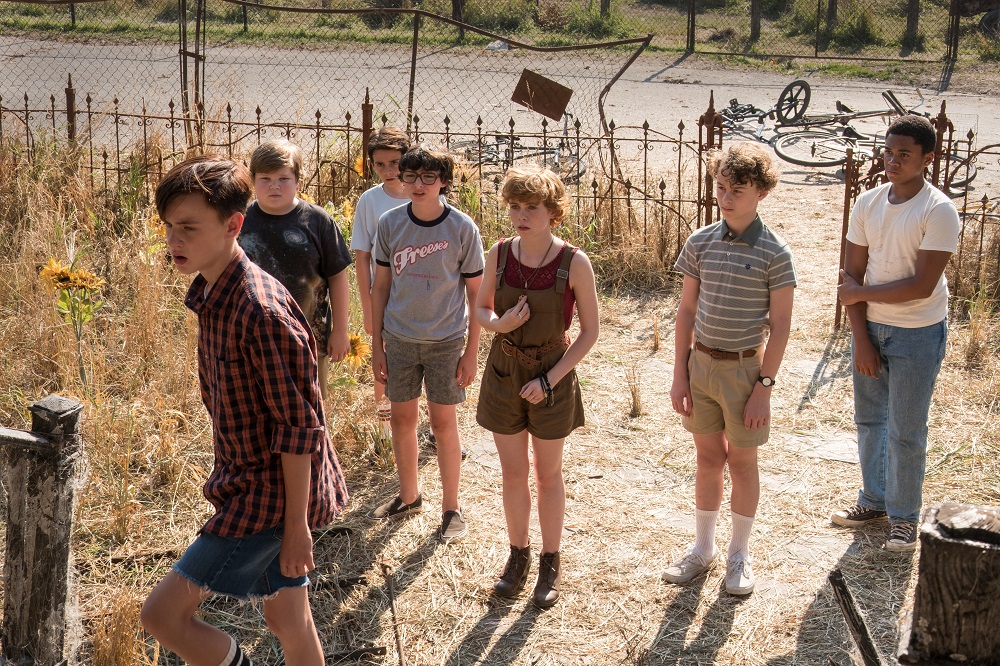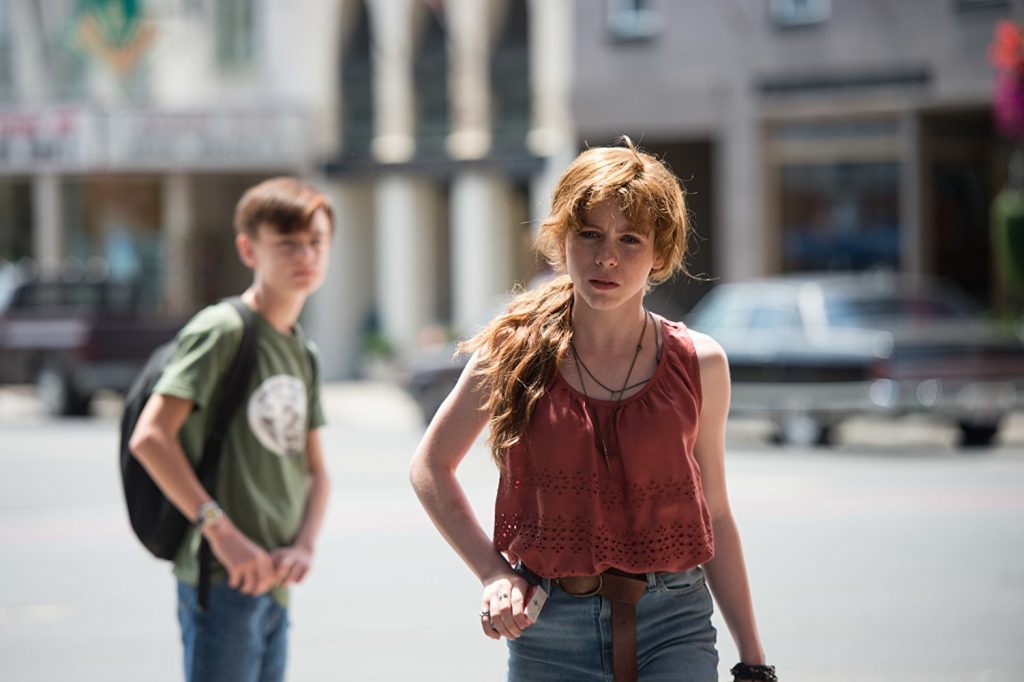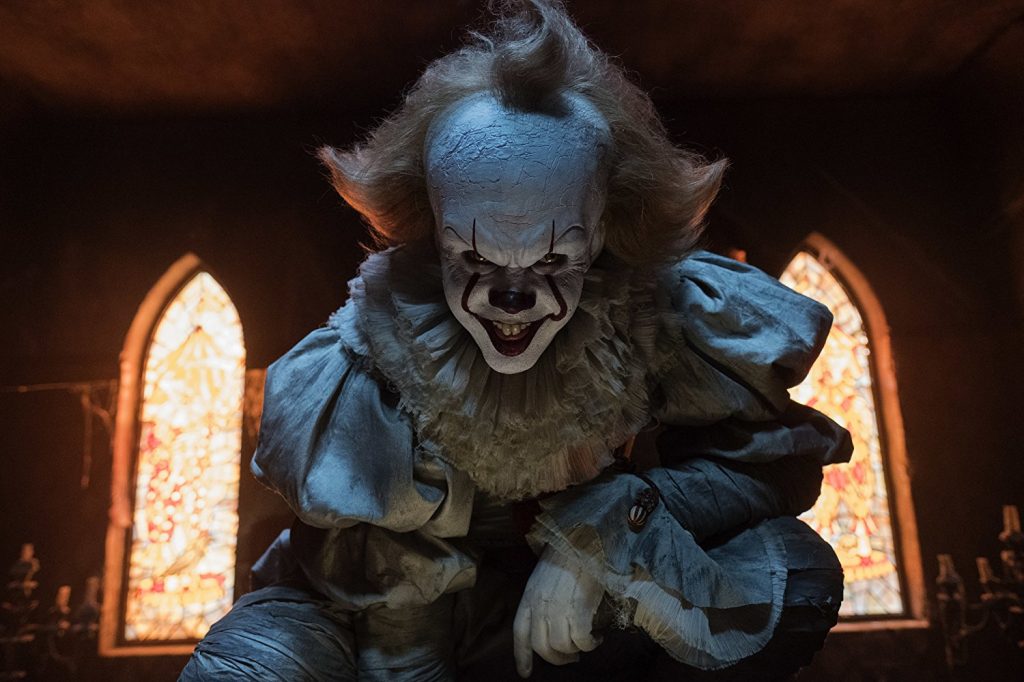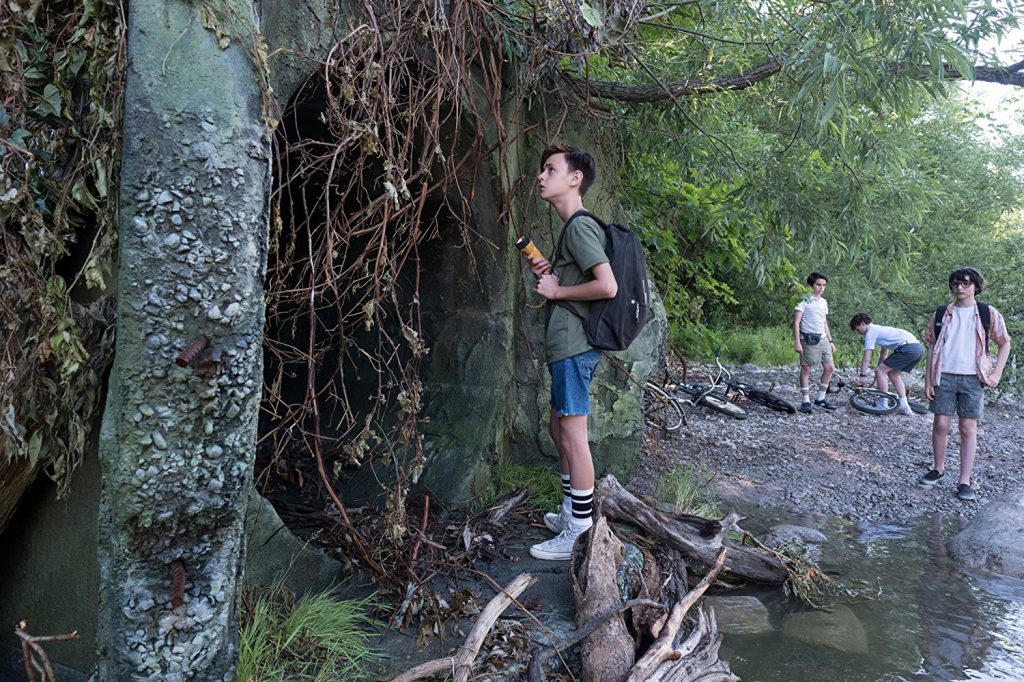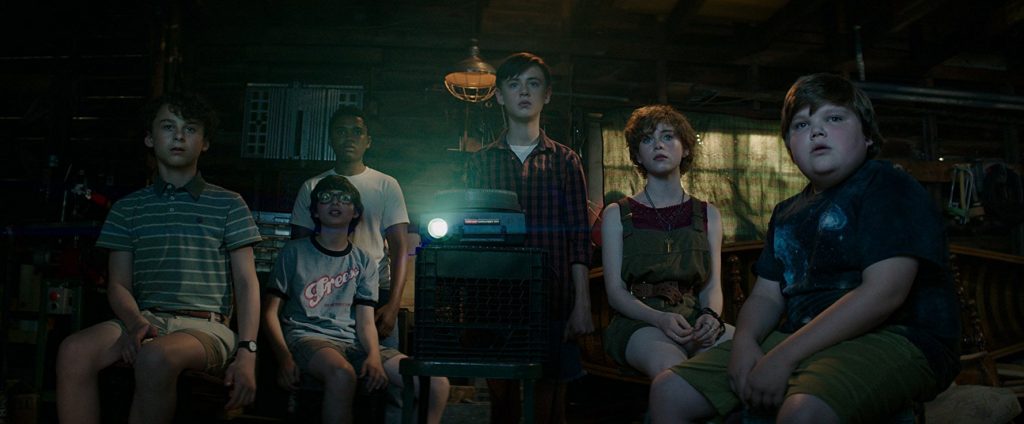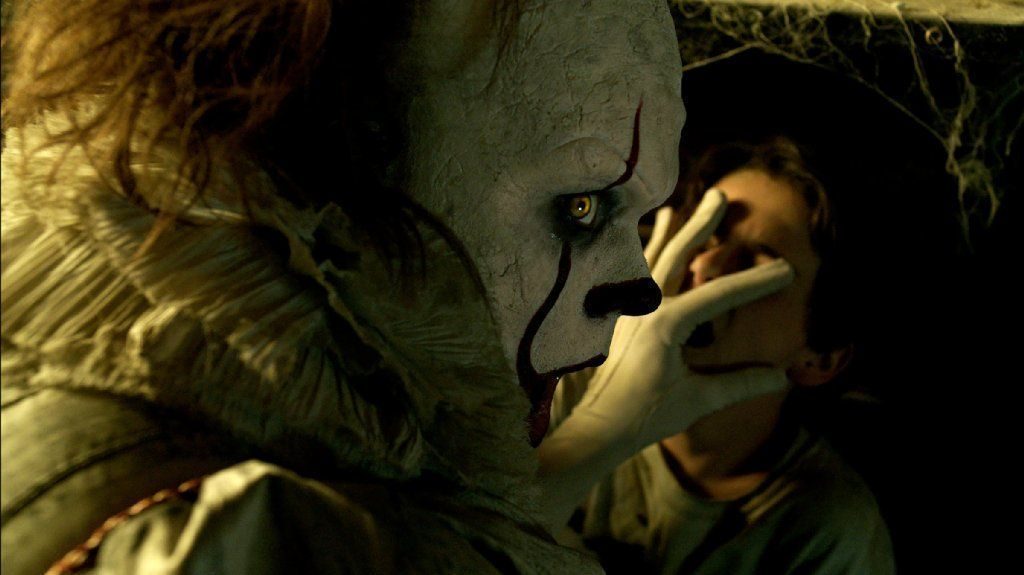 Title: It | Rated: R | Runtime: 135 min | Theaters nationwide
Title: It | Rated: R | Runtime: 135 min | Theaters nationwide
Another month, another High-Low Report on a Stephen King adaptation! Though The Dark Tower left Andrew and Jun feeling numb, they weren’t in a funk for long; It was coming, and there was reason to be excited. Like they did for The Dark Tower, MediaBrewPub’s low-brow and high-brow decided to visit (or, in Andrew’s case, revisit) the source material before the film came out, so they read King’s celebrated novel and watched the Tim Curry-fronted 1990 miniseries, finishing in the nick of time. So, you may ask, did the film have them floating? Read on to find out. While they will venture into spoiler territory, spoiler tags have been added, so consider this a safe read if you haven’t seen the film.
Andrew’s thoughts are in red, and Jun’s in blue.
Truth be told, I don’t enjoy watching horror movies, so It should not have been on my radar. However, I tend to gravitate toward films based on the filmmaker involved, so in this case, my interest in It came from the fact that at the time, Cary Fukunaga (Beasts of No Nation, True Detective season one) was attached to direct. When Fukunaga left the project, my curiosity dropped, and I thought no more of the film until the impressive teaser trailer surfaced. A few days later, a draft of the script – written by Fukunaga and Chase Palmer – leaked, which I acquired and pored over because, hey, curiosity. What I read intrigued me, and that’s what compelled me to read the novel and watch the miniseries. While the latter is too cheesy to take seriously, the former makes for an absolutely breathtaking experience. When reading the novel, I became excited for the film, which not only looked marvelous but also seemed to do the source material justice.
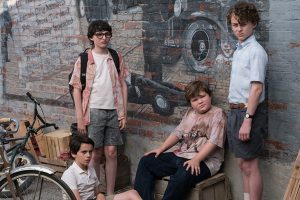 There’s a lot to like about Andy Muschietti’s It. It’s quite fun. Scary is a relative term, but I would use that to describe it. The cast who play the Losers – our heroic group of children – light up the screen with their chemistry and presence. It’s great to look at. I think it does a good job at capturing the mood and spirit of the novel. Now, as an adaptation of King’s story (the ‘50s portion of it, at least – this adaptation will be split into two films), it’s a bit of a mixed bag, and I imagine we’ll be talking a lot about some of the creative liberties the filmmakers take here. Viewers who haven’t read the novel will likely enjoy the film more than those who have.
There’s a lot to like about Andy Muschietti’s It. It’s quite fun. Scary is a relative term, but I would use that to describe it. The cast who play the Losers – our heroic group of children – light up the screen with their chemistry and presence. It’s great to look at. I think it does a good job at capturing the mood and spirit of the novel. Now, as an adaptation of King’s story (the ‘50s portion of it, at least – this adaptation will be split into two films), it’s a bit of a mixed bag, and I imagine we’ll be talking a lot about some of the creative liberties the filmmakers take here. Viewers who haven’t read the novel will likely enjoy the film more than those who have.
Andrew, as someone who’s familiar with the novel and King’s oeuvre, how do you feel about the film?
I was very excited going into the theater. Unlike The Dark Tower, the studio (New Line) seemed to have a strong plan for what they wanted to do with the film (creative differences with Fukunaga aside), and they also had a very thoughtful marketing campaign, capitalizing off the nostalgia of the miniseries. Everything seemed planned out, down to the fact that It’s return to the big screen coincided with It’s return to Derry (once every 27 years). The film looked ready for a big weekend despite the lack of headliners in its cast.
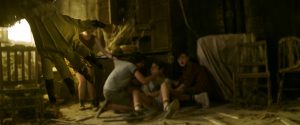 Having said all that, there is always a part of me that is apprehensive when watching a King adaptation. I’m normally fine with books being turned into movies; I understand the challenges and am not upset when creative liberties are taken and subtle bits of story telling are left out because of the inability to be inside the minds of the characters. But with King, his best moments are writing the subtleties. His stories are in the details, and that’s hard to do in film. You can imagine my surprise when I started watching this film and thought to myself, “Damn, they are really nailing some of the small things.” There are many iconic moments in the book, and instead of trying to capture them all, they picked a few and made it a point to really nail those. I appreciated that. The miniseries felt like a checklist of watered-down moments from the book whereas this really felt like an adapted story paying homage to wonderful source material. It helped that they moved the time period from 1958 to 1988; this allowed them to stay true to spirit while giving them the freedom to do things differently. This is how I felt through the majority of the movie.
Having said all that, there is always a part of me that is apprehensive when watching a King adaptation. I’m normally fine with books being turned into movies; I understand the challenges and am not upset when creative liberties are taken and subtle bits of story telling are left out because of the inability to be inside the minds of the characters. But with King, his best moments are writing the subtleties. His stories are in the details, and that’s hard to do in film. You can imagine my surprise when I started watching this film and thought to myself, “Damn, they are really nailing some of the small things.” There are many iconic moments in the book, and instead of trying to capture them all, they picked a few and made it a point to really nail those. I appreciated that. The miniseries felt like a checklist of watered-down moments from the book whereas this really felt like an adapted story paying homage to wonderful source material. It helped that they moved the time period from 1958 to 1988; this allowed them to stay true to spirit while giving them the freedom to do things differently. This is how I felt through the majority of the movie.
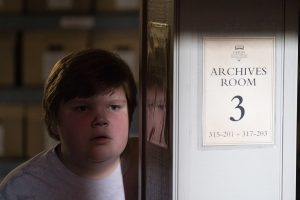 Unfortunately, they made a few big ticket changes that certainly worked from a storytelling perspective, but made the film less compelling than the novel. Mike (Chosen Jacobs), not Ben (Jeremy Ray Taylor), is the historian of the group. In the novel, Ben is the ideas/tech guy who teaches the rest of the Losers how to get things done (for lack of a better way to put it). These separate roles allow both characters to contribute to the group dynamic. With Ben being the historian here as well as the omission of an “ideas guy,” it leaves Mike out in the cold as far as character depth. This is particularly disappointing because he is the only person of color in the group, and to cut that character off at the knees seems quite obtuse given the state of unease in many parts of the country now. Another sticking point for me is the fact that the Losers Club’s bond in the movie is not nearly as strong as it is in the novel. The magic in the book stemmed from this unrelenting loyalty the group had to each other. You don’t get that from the movie. When I was reading, there was a wonderful moment when Richie (Finn Wolfhard) is following Bill (Jaeden Lieberher) into one of the many dangerous situations they find themselves in. He thinks to himself that he would die for Bill, and he accepts it wholeheartedly. The way the movie wrote the group, they are not that close and Bill is definitely not that powerful a figure.
Unfortunately, they made a few big ticket changes that certainly worked from a storytelling perspective, but made the film less compelling than the novel. Mike (Chosen Jacobs), not Ben (Jeremy Ray Taylor), is the historian of the group. In the novel, Ben is the ideas/tech guy who teaches the rest of the Losers how to get things done (for lack of a better way to put it). These separate roles allow both characters to contribute to the group dynamic. With Ben being the historian here as well as the omission of an “ideas guy,” it leaves Mike out in the cold as far as character depth. This is particularly disappointing because he is the only person of color in the group, and to cut that character off at the knees seems quite obtuse given the state of unease in many parts of the country now. Another sticking point for me is the fact that the Losers Club’s bond in the movie is not nearly as strong as it is in the novel. The magic in the book stemmed from this unrelenting loyalty the group had to each other. You don’t get that from the movie. When I was reading, there was a wonderful moment when Richie (Finn Wolfhard) is following Bill (Jaeden Lieberher) into one of the many dangerous situations they find themselves in. He thinks to himself that he would die for Bill, and he accepts it wholeheartedly. The way the movie wrote the group, they are not that close and Bill is definitely not that powerful a figure.
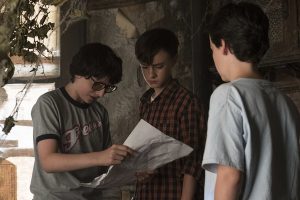 This isn’t to say that the choices the filmmakers made did not work as a story – it just made me feel like there could have a been a better story to tell. I liken it to trading away a one dollar bill for a bunch of small change of almost equal value. You’re getting most of your money back, but it’s not quite as much and it’s in bits and pieces instead of one efficient form. This film felt like an It story that was 85-cents-on-the-dollar compared to the novel. I liked it, but the quality of the original hurts the adaptation.
This isn’t to say that the choices the filmmakers made did not work as a story – it just made me feel like there could have a been a better story to tell. I liken it to trading away a one dollar bill for a bunch of small change of almost equal value. You’re getting most of your money back, but it’s not quite as much and it’s in bits and pieces instead of one efficient form. This film felt like an It story that was 85-cents-on-the-dollar compared to the novel. I liked it, but the quality of the original hurts the adaptation.
I feel like if we would have flipped the order on how we took in the various properties of It, I would have enjoyed the movie a lot more. Alas, that would mean this High-Low Report would be released at a irrelevant time, and we can’t do that to our faithful readers (or, more aptly, YOUR faithful readers).
So while we’re on the topic of reading King’s work – you’ve now read a few of his stories and have a grasp of what his storytelling style is. As a film buff, what is it about his writing that makes it both compelling but oftentimes difficult to translate to the screen? With a mixed bag of adaptations attached to his intellectual properties, I’m wondering if you can shed some light as to why they tend to be so hit or miss.
The King works that I’ve read now are The Gunslinger, The Body (a novella), and It, and I’ve seen the film adaptations for all three (The Dark Tower, Stand by Me, and – of course – It respectively). As you’ve noted, what I’ve noticed about his writing style is that he elaborates in immense detail, and those details aren’t limited to the physical; he wants his readers to get a sense of what and how his characters feel and think. With It (which spans almost 1,200 pages), he sometimes dedicates paragraphs, if not pages, describing how his characters are processing their emotions and thoughts to the point where he seems to go off on tangents, but even those seemingly extraneous descriptions help us understand what is going on in the characters’ minds. It’s a great way for us to empathize with his characters, and it works so well because it’s operating within the medium of a book.
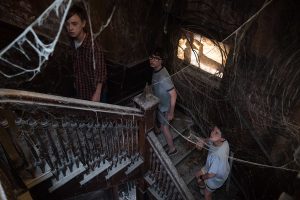 Time is a luxury that books tend to enjoy and provide for the reader, whereas in cinema, there’s a threshold regarding how long a film can hold our attention. That said, adapting King’s stories (especially his longer ones) is difficult because one has to condense incredibly rich storytelling to essentially a two-hour-long film, and each subtraction carries tremendous weight. That’s not to say that adapting King for film is impossible; it just means that one must practice precise economic storytelling to guarantee a compelling story, fully realized characters, and the King spirit. However, there’s the caveat that King fans will likely enjoy the source material more than the adaptation, no matter how good it may be. That’s how I feel about Stand by Me (which is actually my favorite film) and It. As for The Dark Tower, the less said about that, the better.
Time is a luxury that books tend to enjoy and provide for the reader, whereas in cinema, there’s a threshold regarding how long a film can hold our attention. That said, adapting King’s stories (especially his longer ones) is difficult because one has to condense incredibly rich storytelling to essentially a two-hour-long film, and each subtraction carries tremendous weight. That’s not to say that adapting King for film is impossible; it just means that one must practice precise economic storytelling to guarantee a compelling story, fully realized characters, and the King spirit. However, there’s the caveat that King fans will likely enjoy the source material more than the adaptation, no matter how good it may be. That’s how I feel about Stand by Me (which is actually my favorite film) and It. As for The Dark Tower, the less said about that, the better.
We should also consider the filmmaker and studio’s approach to the source material, as the quality and veracity ultimately rests on the people involved. Sometimes there’s a specific aspect in a King story that they want to capture and build upon, so the end result could be quite different to the book (I imagine this is what Stanley Kubrick’s adaptation of The Shining, which King reportedly disapproves of, is like). Sometimes, as in the case of The Dark Tower, the studio believes that a cinematic/multimedia universe can be concocted from it, so they may chase results without putting the proper amount of effort and thought into the project to make it good.
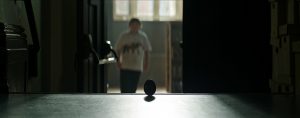 I know that after Fukunaga exited It, he said that he wanted to make an “elevated horror film,” whereas New Line wanted a conventional horror film. I didn’t quite understand what he meant at that time, but after watching the film, it hit me. As fun and scary as It is, it’s a conventional horror film, chock-full of jump scares that it scrambles to get to, wanting the audience to react in the same way they would to any other typical horror film. You know when the scares are coming, too; a pause in the music, with only a few crisp sound effects playing, means there’s one on the way. The original Fukunaga-Palmer script isn’t like that – it’s really a slow build that’s more unsettling than it is scary.
I know that after Fukunaga exited It, he said that he wanted to make an “elevated horror film,” whereas New Line wanted a conventional horror film. I didn’t quite understand what he meant at that time, but after watching the film, it hit me. As fun and scary as It is, it’s a conventional horror film, chock-full of jump scares that it scrambles to get to, wanting the audience to react in the same way they would to any other typical horror film. You know when the scares are coming, too; a pause in the music, with only a few crisp sound effects playing, means there’s one on the way. The original Fukunaga-Palmer script isn’t like that – it’s really a slow build that’s more unsettling than it is scary.
When adapting any story, I always believe that the adaptation should get the most important things from the story right. It should live and die by its portrayal of the Losers. As you said, the film does take creative liberties when translating a few of them for the big screen, some of which work and others… not so much.
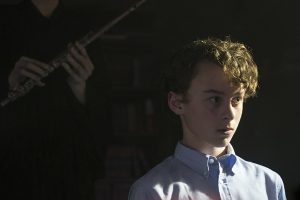 Let’s address the film’s Losers that each of us like. I really got a kick out of Richie and Eddie (Jack Dylan Grazer), which makes me happy considering the latter is my favorite from the novel. In the novel, Richie frequently toes that fine line between funny and annoying, but here, he’s never annoying. He’s great as the comic relief, and Wolfhard delivers some drop-dead hilarious lines with verve, particularly when Eddie is involved. The translation of Eddie from book to screen is pitch-perfect, and much of that is on Grazer, whose high-strung performance is utterly enjoyable from beginning to end. Stan (Wyatt Oleff, full of gravitas) is arguably the least developed character in the novel, but I think the filmmakers subtly flesh him out in ways that highlight his personality. Plus, if the sequel does closely follow the novel’s adult storyline, I’d say that this film sets him up quite well for what is to come. The chemistry shared between these three actors is just a joy to watch, and it shows whenever they play off of each other.
Let’s address the film’s Losers that each of us like. I really got a kick out of Richie and Eddie (Jack Dylan Grazer), which makes me happy considering the latter is my favorite from the novel. In the novel, Richie frequently toes that fine line between funny and annoying, but here, he’s never annoying. He’s great as the comic relief, and Wolfhard delivers some drop-dead hilarious lines with verve, particularly when Eddie is involved. The translation of Eddie from book to screen is pitch-perfect, and much of that is on Grazer, whose high-strung performance is utterly enjoyable from beginning to end. Stan (Wyatt Oleff, full of gravitas) is arguably the least developed character in the novel, but I think the filmmakers subtly flesh him out in ways that highlight his personality. Plus, if the sequel does closely follow the novel’s adult storyline, I’d say that this film sets him up quite well for what is to come. The chemistry shared between these three actors is just a joy to watch, and it shows whenever they play off of each other.
While I understand your issues with Bill’s translation, I think many of the creative liberties taken with him rests on the fact that his younger brother Georgie (an incredibly effective Jackson Robert Scott) is never found. Yes, it makes for a different Bill, but I didn’t mind his changes all that much, and Lieberher is terrific in the role, especially when it comes to the emotionally charged scenes.
What about you, Andrew? Which of the film’s Losers do you like, and do you think they translate well from book to screen?
As a whole, I think the filmmakers did a great job presenting the Losers Club on screen. In particular, Wolfhard did such a wonderful job playing Richie that he brought out a likability in the character that I think goes beyond what you see in the book. The way he delivers his humor felt so authentic – beyond just a defense mechanism – which periodically gets annoying in the novel. In fact, you can almost feel the difference between his authentically funny moments and the moments when he uses his humor to deflect his discomfort. My only gripe was his showdown with Bill. It worked onscreen and both actors felt genuine – I just like the original story better. I won’t retread your thoughts on Stan and Eddie too much but I wholeheartedly agree. In particular with Stan, the moment when he straightened the picture gave you insight into his character without any explicit explanation. It was very King and also a little hat tip to my favorite novel, The Gunslinger – “It spoke of a man who might straighten bad pictures in strange hotel rooms.” All things serve the beam, my friend (shout-out to you Constant Readers out there).
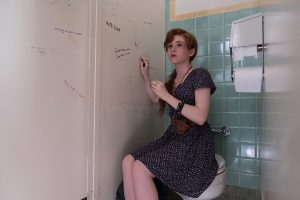 I enjoyed the treatment Bev (Sophia Lillis) received. While Ben was Bill’s right-hand man in the novel, it is clear they made it a priority to make Bev a near-partner to Bill in the adaptation. She definitely came across as the toughest character and, unlike the book’s Bev, didn’t seem to have the same hang-ups of feeling like a loser like the rest of the club. When she tells Bill, “I didn’t do all the things they said I did,” it was clear that his opinion mattered in a way the rest of the public’s didn’t. I appreciate that the one female member of the group was also the one who was most comfortable in her own skin. I’d also say that I find the decision of the filmmakers to allow a pre-teen girl to use her womanhood in such an overt manner was a risk that paid off for the story’s flow. I haven’t heard any backlash, but I’m sure there will be plenty of folks protesting the sexualization of minors on film. Newsflash, folks: kids figure this stuff out earlier than we want them to. And while I was initially upset that they made her the damsel in distress near the end of the film, I’d like to think that she was the only one who brought the Losers together; that Bill isn’t their compass, it’s Bev. In which case, if Bill was taken, not everyone might have pulled together to face It. It’s a bit of a stretch, but I’d rather go with that than assume they negated all the good work they had put into making her a character of strength.
I enjoyed the treatment Bev (Sophia Lillis) received. While Ben was Bill’s right-hand man in the novel, it is clear they made it a priority to make Bev a near-partner to Bill in the adaptation. She definitely came across as the toughest character and, unlike the book’s Bev, didn’t seem to have the same hang-ups of feeling like a loser like the rest of the club. When she tells Bill, “I didn’t do all the things they said I did,” it was clear that his opinion mattered in a way the rest of the public’s didn’t. I appreciate that the one female member of the group was also the one who was most comfortable in her own skin. I’d also say that I find the decision of the filmmakers to allow a pre-teen girl to use her womanhood in such an overt manner was a risk that paid off for the story’s flow. I haven’t heard any backlash, but I’m sure there will be plenty of folks protesting the sexualization of minors on film. Newsflash, folks: kids figure this stuff out earlier than we want them to. And while I was initially upset that they made her the damsel in distress near the end of the film, I’d like to think that she was the only one who brought the Losers together; that Bill isn’t their compass, it’s Bev. In which case, if Bill was taken, not everyone might have pulled together to face It. It’s a bit of a stretch, but I’d rather go with that than assume they negated all the good work they had put into making her a character of strength.
I didn’t have any “favorites” per se from the novel but I did have very strong attachments to Richie, Mike, and particularly, Ben. While I think Richie was very well represented, I can’t say the same for Mike and Ben, which I alluded to in my initial response.
We’ve discussed the positives of the Losers Club. What do you think was missed with their presentation on screen, and are there any creative liberties you feel didn’t work in the transition from novel to film?
That’s a very interesting read of Beverly. Like you, I appreciate how the film goes great lengths to elevate and empower her, and making her clearly the most compelling character from the Losers is a great way of adapting her for the big screen. I’d say they honor her up until the climax begins to unfold, and this is where I have to disagree with you. I understand what you’re saying about Bev being the one who brings the group together, but her becoming a damsel in distress in order to have this happen is a bitter storytelling choice that the film never quite recovers from. That the filmmakers develop her into a fully realized female character only to strip her of her agency feels disingenuous and jarring, which is a shame since everything that comes before is just great character work. Still, Lillis delivers an honest and mature performance that’s simply phenomenal, and she commands the screen so well.
 I echo your thoughts regarding Ben (whose innocence is sweet to behold thanks to Taylor’s charisma) and Mike. To be honest, I wouldn’t mind the creative liberties taken with Ben if it didn’t mean that Mike got shafted as a result. I mean, at least give Mike a distinct personality or expertise/talent that he can bring to the Losers so that he’s something other than the token black guy! The omission of race relations that informs Mike’s story in the novel doesn’t help matters, especially since it also means that Losers tormentor Henry Bowers (Nicholas Hamilton) – who hates Mike the most in the novel – is watered down. There’s barely anything for Jacobs to utilize, so his performance unfortunately doesn’t soar like the others do.
I echo your thoughts regarding Ben (whose innocence is sweet to behold thanks to Taylor’s charisma) and Mike. To be honest, I wouldn’t mind the creative liberties taken with Ben if it didn’t mean that Mike got shafted as a result. I mean, at least give Mike a distinct personality or expertise/talent that he can bring to the Losers so that he’s something other than the token black guy! The omission of race relations that informs Mike’s story in the novel doesn’t help matters, especially since it also means that Losers tormentor Henry Bowers (Nicholas Hamilton) – who hates Mike the most in the novel – is watered down. There’s barely anything for Jacobs to utilize, so his performance unfortunately doesn’t soar like the others do.
That’s it for the Losers. Let’s move on to the elephant in the room: It, or – as most people will recognize It – Pennywise. Bill Skarsgård is malicious and manic as the dancing clown, and I found him to be much more disconcerting than Curry in the miniseries, especially when noticing small flourishes like Pennywise drooling as well as his physical antics. His design complements the tone very well, particularly how his mouth opens up to feature rows of teeth like a lamprey’s. I only wish the film featured Skarsgård more; when he’s sharing scenes with the Losers (and speaking), the terror feels palpable as opposed to when It shapeshifts into CG renditions of their fears, which makes the picture feel like a generic horror film where the characters attempt to flee from the monster.
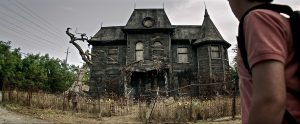 Of course, the film tinkers a bit when portraying It, which makes sense considering that the novel will be split into two films. It’s origins are left in the dark, perhaps to be explored in the sequel. While It’s history, specifically It’s relationship with Derry, is touched upon, I can’t really say that I can fully comprehend it like I did with the novel. Speaking of which, I have to talk a bit about Derry, which I think is wonderfully presented on the big screen thanks to longtime Park Chan-wook collaborator Chung Chung-hoon’s tangible cinematography and Claude Paré’s attentive production design. From the Barrens and the house on Neibolt Street to the minor characters who populate the town, everything looks great – just how I imagined it all when reading the novel.
Of course, the film tinkers a bit when portraying It, which makes sense considering that the novel will be split into two films. It’s origins are left in the dark, perhaps to be explored in the sequel. While It’s history, specifically It’s relationship with Derry, is touched upon, I can’t really say that I can fully comprehend it like I did with the novel. Speaking of which, I have to talk a bit about Derry, which I think is wonderfully presented on the big screen thanks to longtime Park Chan-wook collaborator Chung Chung-hoon’s tangible cinematography and Claude Paré’s attentive production design. From the Barrens and the house on Neibolt Street to the minor characters who populate the town, everything looks great – just how I imagined it all when reading the novel.
Andrew, what are your thoughts on the film’s It/Pennywise? Do you believe it does a good job at presenting or exploring the relationship between It and Derry?
A quick revisit to Bev – I really was looking for some positive spin I could place on it. Thanks for killing that dream. I think we both expect that Bev is going to play a parallel to Audra (Bill’s wife) in the second chapter, which makes sense to me but is probably unnecessary. That’s really the main reason I can see to compromise the strength of her character.
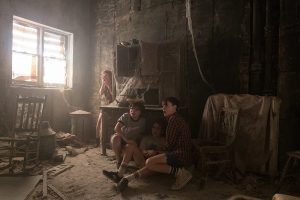 I think given the opportunities made available to him, Skarsgård did an excellent job as Pennywise. There are limited moments for him to show his personality, but when given the chance, he really did a great job being both menacing while also playful. My favorite moment was probably when he took Bill hostage and tried to barter his safety and Bill’s life for the safety of the remaining members of the Losers Club. He maintained his menace while also displaying just the slightest hint of desperation that the Losers latched onto. It helped that the scene led to one of my favorite Richie moments – when he declares, “And now, I have to kill this fucking clown,” or something of that nature. I really do like the way the CGI was imagined, but my problem is that it was given to us too sequentially like a laundry list of scary moments. They probably could have saved some of the scares for the next film as flashbacks and focused more on developing the Losers Club and their dynamic. It’s too bad because if you look at each scene on its own, they are all pretty well thought out. If you take out the repetitiveness, you can focus on creating more conflict with Bowers or other adults in Derry. By focusing on the scary moments, they neglected to build upon the club’s bond and how isolated they feel from the rest of the community. I will say that the movements of both Pennywise and the CG It felt very spider-esque which, given our knowledge of It’s final form, was a nice little nod to the source material. In all, Pennywise was sufficiently terrifying.
I think given the opportunities made available to him, Skarsgård did an excellent job as Pennywise. There are limited moments for him to show his personality, but when given the chance, he really did a great job being both menacing while also playful. My favorite moment was probably when he took Bill hostage and tried to barter his safety and Bill’s life for the safety of the remaining members of the Losers Club. He maintained his menace while also displaying just the slightest hint of desperation that the Losers latched onto. It helped that the scene led to one of my favorite Richie moments – when he declares, “And now, I have to kill this fucking clown,” or something of that nature. I really do like the way the CGI was imagined, but my problem is that it was given to us too sequentially like a laundry list of scary moments. They probably could have saved some of the scares for the next film as flashbacks and focused more on developing the Losers Club and their dynamic. It’s too bad because if you look at each scene on its own, they are all pretty well thought out. If you take out the repetitiveness, you can focus on creating more conflict with Bowers or other adults in Derry. By focusing on the scary moments, they neglected to build upon the club’s bond and how isolated they feel from the rest of the community. I will say that the movements of both Pennywise and the CG It felt very spider-esque which, given our knowledge of It’s final form, was a nice little nod to the source material. In all, Pennywise was sufficiently terrifying.
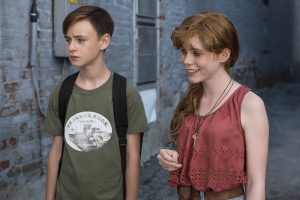 It’s harder for me to judge the relationship between Derry and It from this film because as I was watching the movie, all the context from the book was in my head. Separating what I already know from the novel and what I see on film can often be tough to do in the midst of viewing, but my verdict is inconclusive. It’s very difficult for me to consider this film as a standalone piece because I know there is a second chapter coming. However, it’s clear to me that either the connection between Derry and It was left open ended to allow for a deeper dive in the second film, or they are pushing it to the background and focusing more on the Losers and their battle with It. I’m really hoping it’s the former. Most of the knowledge about Derry I gleaned from the film were from very small snippets of interaction that the characters had with adults, Mike’s family history, or the moments when Ben shared his historical knowledge. Basically, it was limited. Nothing slammed this point home for me more than my wife’s question after the movie: “So are adults in Derry just all bad?” That question shows how little context was given to members of the audience who were going in blind to the lore of It.
It’s harder for me to judge the relationship between Derry and It from this film because as I was watching the movie, all the context from the book was in my head. Separating what I already know from the novel and what I see on film can often be tough to do in the midst of viewing, but my verdict is inconclusive. It’s very difficult for me to consider this film as a standalone piece because I know there is a second chapter coming. However, it’s clear to me that either the connection between Derry and It was left open ended to allow for a deeper dive in the second film, or they are pushing it to the background and focusing more on the Losers and their battle with It. I’m really hoping it’s the former. Most of the knowledge about Derry I gleaned from the film were from very small snippets of interaction that the characters had with adults, Mike’s family history, or the moments when Ben shared his historical knowledge. Basically, it was limited. Nothing slammed this point home for me more than my wife’s question after the movie: “So are adults in Derry just all bad?” That question shows how little context was given to members of the audience who were going in blind to the lore of It.
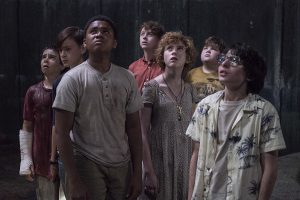 All this provides me with a combination of hope and wariness for the second film. Knowing that the Losers Club’s interactions with Pennywise as adults are much more dialogue-driven leads me to the idea that we will get past the surface of Skarsgård’s interpretation of everyone’s favorite clown. Also, it must be noted that the history of Derry is really uncovered during the twenty-seven-year gap between the Losers’ childhood and adult confrontations by Mike (although based off of where the film is going, it might be Ben) through his personal journal on the history of Derry. I picture the second film being a combination of flashbacks to the historical disasters in Derry as well as the death of Mike’s family, and Pennywise’s hunt of the adult versions of the Losers Club. If it pans out that way, I think there is significant potential for the combined two films being a very successful adaptation of such iconic material. If not… well, at least this movie was fun.
All this provides me with a combination of hope and wariness for the second film. Knowing that the Losers Club’s interactions with Pennywise as adults are much more dialogue-driven leads me to the idea that we will get past the surface of Skarsgård’s interpretation of everyone’s favorite clown. Also, it must be noted that the history of Derry is really uncovered during the twenty-seven-year gap between the Losers’ childhood and adult confrontations by Mike (although based off of where the film is going, it might be Ben) through his personal journal on the history of Derry. I picture the second film being a combination of flashbacks to the historical disasters in Derry as well as the death of Mike’s family, and Pennywise’s hunt of the adult versions of the Losers Club. If it pans out that way, I think there is significant potential for the combined two films being a very successful adaptation of such iconic material. If not… well, at least this movie was fun.
What about you? What do you think the future holds for It: Chapter Two?
I am cautiously optimistic for It: Chapter Two (assuming, of course, that will be the sequel’s title). Those who are familiar with the novel will know that the events portrayed in this film serve as flashbacks when the Losers return to Derry as adults. The ‘50s sequences are the best parts of the novel, and they essentially prop up the events occurring in the ‘80s. It will be interesting to see whether the filmmakers – Muschietti will likely return once the film is greenlit – can develop adult storylines that stand well on their own and make for a thoroughly engaging story.
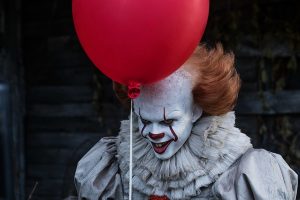 As I’m writing this, I came across an interview where Muschietti and his sister, producer Barbara, spoke about their plans for the sequel, and I feel somewhat conflicted after reading it. Despite Ben taking on the historian role in this film, the film will stay true to the novel by having Mike stay in Derry and call the Losers back home. Mike has a very active role in the novel’s adult portions, so I hope this means that they’ll go great lengths to flesh him out (even though I’m not wild about the idea of him becoming a junkie). The young Losers will return in flashbacks, which would be great if there are scenes that build upon their chemistry and relationships, especially if Mike is involved. What makes me pause is the idea that Mike figures out the Ritual of Chüd during that time gap; this opens up a massive supernatural can of worms that this film doesn’t exactly prepare for, and I question how it would play out in the sequel. What’s more, if the film begins and ends in the present day (updated from the ‘80s), and given all that I’ve just mentioned, you could be looking at a very flashback-heavy picture, which I don’t know if I would like. Given some of the creative liberties we’ve noted over the course of this High-Low Report, I was wondering whether the filmmakers would be unafraid to switch up some of the adult Losers’ paths and fates, but after reading that interview, I have a feeling it will be relatively faithful to the novel in that regard. I am, however, definitely looking forward to the Losers reuniting after 27 years and facing Pennywise again – perhaps this could push the film closer to being unsettling rather than scary. All that being said, there are a lot of elements to juggle for the sequel, so I hope Muschietti and co. have a strong grasp on the story.
As I’m writing this, I came across an interview where Muschietti and his sister, producer Barbara, spoke about their plans for the sequel, and I feel somewhat conflicted after reading it. Despite Ben taking on the historian role in this film, the film will stay true to the novel by having Mike stay in Derry and call the Losers back home. Mike has a very active role in the novel’s adult portions, so I hope this means that they’ll go great lengths to flesh him out (even though I’m not wild about the idea of him becoming a junkie). The young Losers will return in flashbacks, which would be great if there are scenes that build upon their chemistry and relationships, especially if Mike is involved. What makes me pause is the idea that Mike figures out the Ritual of Chüd during that time gap; this opens up a massive supernatural can of worms that this film doesn’t exactly prepare for, and I question how it would play out in the sequel. What’s more, if the film begins and ends in the present day (updated from the ‘80s), and given all that I’ve just mentioned, you could be looking at a very flashback-heavy picture, which I don’t know if I would like. Given some of the creative liberties we’ve noted over the course of this High-Low Report, I was wondering whether the filmmakers would be unafraid to switch up some of the adult Losers’ paths and fates, but after reading that interview, I have a feeling it will be relatively faithful to the novel in that regard. I am, however, definitely looking forward to the Losers reuniting after 27 years and facing Pennywise again – perhaps this could push the film closer to being unsettling rather than scary. All that being said, there are a lot of elements to juggle for the sequel, so I hope Muschietti and co. have a strong grasp on the story.
 Regardless of how the sequel may turn out, I will say that all in all, I like It. I agree with your assessment of the CG It scenes playing out too sequentially; the first half hour or so feels very setpiece-driven instead of character-driven, and it goes to show that this is very much a conventional horror film that just wants to get from one scare to the next. Though I take issue with certain storytelling decisions pertaining to Bev and Mike, the Losers are magnetic as a group, and the cast imbue the film with tremendous heart. Adapting the novel was always going to be an unenviable task for the filmmakers, but I’m glad they got the mood and spirit right. If the film compels viewers to visit the source material, all the better.
Regardless of how the sequel may turn out, I will say that all in all, I like It. I agree with your assessment of the CG It scenes playing out too sequentially; the first half hour or so feels very setpiece-driven instead of character-driven, and it goes to show that this is very much a conventional horror film that just wants to get from one scare to the next. Though I take issue with certain storytelling decisions pertaining to Bev and Mike, the Losers are magnetic as a group, and the cast imbue the film with tremendous heart. Adapting the novel was always going to be an unenviable task for the filmmakers, but I’m glad they got the mood and spirit right. If the film compels viewers to visit the source material, all the better.
Any final thoughts about It, Andrew?
I think I would just close by saying that overall, I liked the film. We have spent a lot of time harping on how it could have been better, but at the end of the day, it was an enjoyable movie. Beep, Beep, High-Low Report.
Reading the EW interview is quite encouraging because at least they’ve shown some thought into how everything will tie together as one story. I may not like it as much as the source material, but if they are developing a grander arc for the Losers, then I am hopeful that everything created in Chapter One will be supported by what’s to come in Chapter Two.
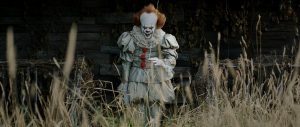 And to echo your statement and provide encouragement, I would suggest to all those who watched the film to read the novel. It is consistently rated as one of King’s best works, and while the time commitment is significant, so is the experience. Dare I say that watching the film first will make the reading more enjoyable because it will enrich a story you are already invested in. Read it, and I guarantee that you’ll float, too!
And to echo your statement and provide encouragement, I would suggest to all those who watched the film to read the novel. It is consistently rated as one of King’s best works, and while the time commitment is significant, so is the experience. Dare I say that watching the film first will make the reading more enjoyable because it will enrich a story you are already invested in. Read it, and I guarantee that you’ll float, too!
Finally, let’s pop a bottle of champagne for the High-Low Report’s first identical score. Cheers, buddy.
Andrew’s Rating: 3.5/5.0
Jun’s Rating: 3.5/5.0
Editor’s note: While Andrew and Jun both gave an identical score for Seven Samurai in last year’s Magnificent Seven High-Low Report, that film was not the focus of that report. That said, we have a question for you to ponder. Is Andrew becoming more of a high-brow, or is Jun becoming more of a low-brow?
* Photos courtesy of Warner Bros.

